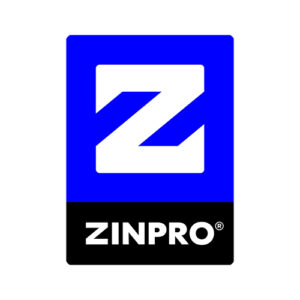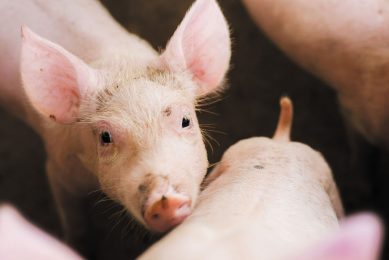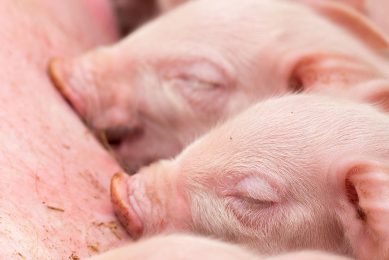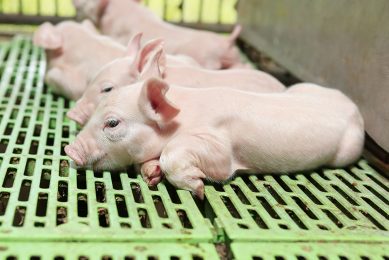Heat stress, trace minerals and gut health

At first sight, heat stress and gut health may not appear to be very much related in swine production. Yet, both worlds do collide. In fact, gut health improvement through nutrition might hold a key to help mitigate the effects of heat stress.
Heat stress can result in significant economic costs to livestock operations. For example, it is estimated that the annual cost of heat stress in the US swine industry is $ 900 million. Of that, about $ 450 million is in the grow-finish stage and about $ 450 million is in the breeding herd.
Based on these estimates, it should come as no surprise that investments in on-farm cooling systems are highly prevalent. However, cooling systems may not always be economically feasible and mechanical failure can cause unplanned heat-stress events.
What’s happening inside the animal?
When an animal experiences heat stress, its core body temperature increases causing blood flow to be diverted from visceral tissue – tissue that lines the blood vessels, stomach, digestive tract and other internal organs – to the skin surface to increase heat dissipation. As blood flow is reduced to the visceral tissue, this causes a reduction in the amount of oxygen (hypoxia) and energy available to the enterocytes (single layer of epithelial cells) lining the intestinal tract. When that occurs, tight junctions that hold the enterocytes together can weaken, allowing pathogens and their toxins to transfer into the bloodstream, ultimately leading to a condition called leaky gut.
With the onset of heat stress, animals often experience a marked reduction in feed intake, which has been hypothesised as a mechanism to help reduce metabolic heat. While a large contributor to lost performance under heat stress, this reduction in feed intake may only partially explain why animals under heat stress have decreased performance.
In addition, a higher respiration rate from the animals trying to cool themselves results in the production of oxygen and nitrogenous free radicals, which can weaken or destroy the intestine’s tight junctions. Severe heat stress may lead to morphological changes in the intestine, such as decreased gut villi height, greater gut villi width and potentially a breakdown of the tight junctions of the enterocytes. The intestine may become vulnerable to transfer of lipopolysaccharides (LPS), or endotoxins, across the intestinal wall and into circulation causing immune system activation.
Figure 1 – Production impact of heat stress.

A key trace mineral for tight junctions
Several research studies have established that the trace mineral zinc plays a key role in maintaining intestinal integrity by strengthening the tight junctions during challenges. Research has shown that zinc upregulates tight junction proteins and heat shock proteins. Furthermore, zinc is an antioxidant, and oxidative stress may play a key role in initiating leaky gut. The research has also shown that the form of zinc fed influences its effectiveness at reducing leaky gut.
Iowa State University conducted a study to demonstrate how acute heat stress conditions contribute to leaky gut. Results showed that feeding performance trace minerals such as Availa-Zn from Zinpro helps decrease the occurrence of leaky gut by improving the viability and integrity of the intestinal system.
In this study, 32 crossbred pigs with an initial weight of 63kg were randomly assigned to 4 of 4 treatments:
- Treatment 1 (Thermo-neutral control): 120 ppm of zinc sulphate fed in thermo-neutral conditions (21°C; 70% humidity); ad libitum feed intake.
- Treatment 2 (Nutrient-restricted thermo-neutral control): 120 ppm of zinc sulphate fed in thermo-neutral conditions (21°C; 70% humidity); restricted feed intake. Animals in this treatment were allowed to consume the same amount of feed as the two heat-stress diets (Treatments 3 and 4, 17%
of ad libitum feed intake); this allows for comparisons in a controlled environment. - Treatment 3 (Heat stress control): 120 ppm of zinc sulphate fed in acute heat-stress conditions (37°C, 40% humidity); ad libitum feed intake.
- Treatment 4 (Heat stress Availa-Zn): 120 ppm of total zinc supplemented (60 ppm complexed zinc and 60 ppm of zinc sulphate) in acute heat-stress conditions (37°C; 40% humidity); ad libitum feed intake.
Acute heat stress conditions
As expected, subjecting pigs to acute heat stress conditions resulted in increased rectal temperatures, increased respiration rates and reduced feed intakes. However, the research also shed light on what’s happening inside the pigs during an acute heat-stress challenge.
Researchers measured ileal permeability – the third and final part of the small intestine – from harvested pigs. Pigs in the heat-stress conditions of treatment 3 and the nutrient-restricted thermal-neutral conditions of treatment 2 showed greater gut permeability compared to pigs in the thermal-neutral conditions of treatment 1. That finding indicates that a heat-stress event, or even a period when animals are under restricted feed intake, such as out of feed events, (nutrient-restricted treatment 2), increases the risk for intestinal permeability (leaky gut).
Figure 2 – Changes in intestinal morphology of swine fed various forms of zinc under thermo-neutral or heat stress conditions.

When the pigs were subjected to acute heat stress conditions, feeding complexed zinc helped decrease gut leakage compared to feeding inorganic zinc sulphate. Pigs fed complexed zinc were able to mount a more effective immune response. Among heat-stressed pigs, those receiving complexed zinc expressed greater concentrations of plasma lipopolysaccharide (LPS) binding protein compared to those receiving zinc sulphate. As an acute-phase protein, LPS binding protein sequesters bacterial LPS so that bacterial LPS can be destroyed by other immune components. Within heat stress treatments, pigs fed complexed zinc (treatment 4) had numerically lower serum endotoxin levels compared to pigs fed zinc sulphate (treatment 3).
Heat stress and trace minerals
Heat stress is a widespread issue that swine producers need to manage. It’s critical to have a plan in place prior to the onset of hot weather conditions to prevent the long-term effects heat stress can have on animal performance. By incorporating performance trace minerals like Availa-Zn into swine diets, animals are better able to reduce the impact of leaky gut during heat stress conditions.
To learn more about inflammation, heat stress and gut health go to EssentialFeed.zinpro.com. The site provides additional insights into inflammation and its link to common production challenges, as well as research summaries demonstrating the role performance trace minerals play in the management of inflammation.
Author: Mark Wilson, swine reproductive physiologist, Zinpro





